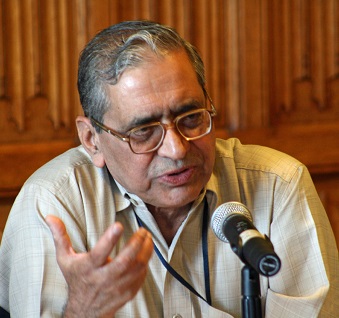
In his own estimate, Prof. Kapil Kapoor has been teaching for over sixty years. He is something of a legend not only among his numerous students, but also among students of Indian Knowledge Systems, of which he has been one of the pioneers in India. Generations of them have been fascinated by his lucid, invigorating and ever original expositions, as a speaker and a writer alike, of the most abstruse concepts of Indian literature, philosophy, aesthetics, languages and textual studies. Above all, he has been an unmatched champion of India’s intellectual traditions.
Prof. Kapil Kapoor has a long list of accomplishments: he taught at Jawaharlal Nehru University, New Delhi, for many years, as Professor of English (in the Centre for Linguistics and English) and as Concurrent Professor at JNU’s Special Centre for Sanskrit Studies (now School of Sanskrit and Indic Studies). He was also Dean of the School of Language, Literature and Culture Studies (1996-1999) and JNU’s Rector (Pro-Vice-Chancellor, 1999-2002). He was a member of numerous bodies, among them the Indian Council of Philosophical Research, the Central University of Higher Tibetan Studies, Sarnath, and the Sanchi University of Buddhist and Indic Studies, Madhya Pradesh. He chaired the important MHRD Language Expert Committee for Comprehensive Language Policy for India, whose report is under consideration, and was Chairman of the Indian Institute of Advanced Study, Shimla. He steered the pioneering CBSE elective course for classes XI and XII, “Knowledge Traditions and Practices of India” (KTPI) and co-edited its two-volume textbook (with Michel Danino).
Prof. Kapil Kapoor has a considerable body of works to his credit, including Language, Literature and Linguistics: The Indian Perspective (1994), South Asian Love Poetry (1994), Canonical Texts of Literary Criticism (1995), Literary Theory: Indian Conceptual Framework (1998), Text and Interpretation: The Indian Tradition (2005), Dimensions of Panini Grammar: Indian Grammatical System (2005), Rati-Bhakti in India’s Narrative Traditions (in Hindi, 2011), Comparative Literary Theory: An Overview (2014) and Abhinavagupta Manuscripts (forthcoming). He also edited Indian Knowledge Systems (2 vols, 2002), an 11-Volume Encyclopaedia of Hinduism (2012), and an Encyclopaedia of Indian Poetics (under publication).
Abstracts of the Lectures
Why Sanskrit is not a dead language, nor the language of gods
There is a common misconception that Sanskrit is a “dead language”. But while the language may not be spoken in the streets of today’s India, it survives in a number of ways in many fields of knowledge and has been an indispensable instrument in shaping the Indian worldview and in the cultural integration of the Indian subcontinent. This talk, in conversation mode, will develop this argument, and will also explain why the label of “language of the gods” sometimes stuck to Sanskrit has failed to do justice to the intellectual traditions that grew around Sanskrit.